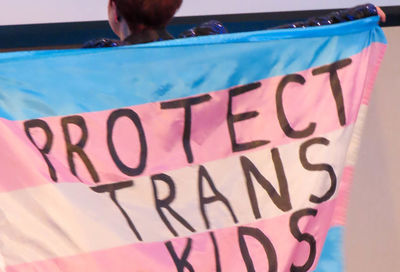Trans Americans protected by Americans with Disabilities Act, court rules
Transgender woman sued Virginia prison officials for refusing to allow her to access hormones and moving her into a men's unit.

Last week, a federal court of appeals ruled that transgender people are protected from discrimination under the Americans with Disabilities Act, giving the transgender community another legal argument to ensure their rights are recognized under law.
The ruling stems from a 2020 lawsuit filed on behalf of Kesha Williams, a transgender woman who was incarcerated in a men’s prison in Virginia despite having socially transitioned and receiving hormone therapy for nearly two decades, uninterrupted, prior to her six-month imprisonment, reports The Hill.
According to the lawsuit, Williams was initially housed in a women’s unit at the Fairfax County Adult Detention Center, but was moved to the men’s facility after she informed a nurse that she is transgender and had not undergone gender confirmation surgery.
Along with her housing reassignment, which resulted in harassment at the hands of guards and fellow prisoners, Williams was forced to give up wearing women’s clothing and gender-affirming toiletries, was forced to submit to body searches by male staff, resulting at least once in injuries at the hands of one guard. She was also denied her hormone medication for weeks at a time, causing her significant mental and emotional distress.
Following her release, she sued Fairfax County Sheriff Stacey Kincaid, as well as a prison nurse and a deputy, alleging that the prison had violated both the Americans with Disabilities Act and the Rehabilitation Act by failing to adequately treat her gender dysphoria — for which the treatment would be allowing Williams to access her hormone medication and be socially affirmed as female.
In responding to the lawsuit, the sheriff’s office argued that gender dysphoria is not a “disability” under the ADA, because it is “an identity disorder not resulting from physical impairments.”
The ADA, initially adopted in 1990, states that the term “disability” does not include “gender identity disorders not resulting from physical impairments,” as well as “transvestism” or “transsexualism.” Attorneys for the defendants argued that the exclusions applied to Williams’ gender dysphoria, meaning she had no right to sue under the ADA.
A district court judge sided with the sheriff and prison officials. But last Tuesday, the 4th U.S. Circuit Court of Appeals reversed the lower court’s ruling, finding that gender dysphoria is not a “gender identity disorder.”
That distinction stems from a 2013 update to the American Psychiatric Association’s Diagnostic and Statistical Manual of Mental Disorders, also known as the DSM-5, which removed the diagnosis of gender identity disorder — referring to the general idea that one’s gender identity does not conform to their assigned sex at birth — and replaced it with gender dysphoria — which refers to the “clinically significant distress” that a person, though not all transgender people, may experience because of the difference between their gender identity and assigned sex at birth.
“Reflecting this shift in medical understanding, we and other courts have thus explained that a diagnosis of gender dysphoria, unlike that of ‘gender identity disorder,’ concerns itself primarily with distress and other disabling symptoms, rather than simply being transgender,” Judge Diana Gribbon Motz wrote on behalf of the appeals court.
Motz went further, declaring that even if gender dysphoria and gender identity were not separate concepts, Williams would still be protected under the ADA because her gender dysphoria has a “known physical basis.”
Olivia Hunt, policy director for the National Center for Transgender Equality, told Metro Weekly in an interview that Motz’s ruling was a “tremendously important decision.”
“We’ve seen an effort over the past few years to get discrimination on the basis of gender dysphoria covered under the Americans with Disabilities Act. There have been several litigation victories, and this is the first time a circuit court has upheld the reasoning used by those other courts,” Hunt said. “This demonstrates that there is no reason under U.S. law for trans people to not be allowed to vindicate their rights by using the Americans with Disabilities Act.”
“When attorneys make the argument that a person can prevail on a claim under the ADA on the basis of gender dysphoria, that is not making a claim that being transgender or nonbinary is a form of disability,” Hunt added. “It’s saying that if you happen to be transgender or nonbinary and you experience gender dysphoria in a way that interferes with your daily life in the way it is defined under the Americans with Disabilities Act, then that is a viable origin for your disability to allow you to recover under the Americans with Disabilities Act.”
Hailing the ruling as an “important milestone,” Hunt noted that there is still significant work that needs to be done to address how civil rights laws apply to and impact transgender and nonbinary individuals.
“This [ruling] confirm that we have another tool in the toolkit available for litigators to help protect our rights under the law,” she said. “But there is still additional action that we can see from Congress and from the administration to improve civil rights protections on a variety of levels, and not just limited to the specific case of discrimination on the basis of simply experiencing gender dysphoria.
“That action includes seeing broadly inclusive rule-making in support of Title IX and Section 1557 of the Affordable Care Act. That includes the VA [Department of Veterans Affairs] lifting the ban on transition-related surgery, and involves strong, inclusive language in nondiscrimination provisions specifying that trans people are included and are intended to be protected as members of American society at all levels of government,” Hunt added. “This is one tool, but it is not the entire toolbox.”
GLBT Legal Advocates and Defenders (GLAD) and the National Center for Lesbian Rights, which represented Williams in the lawsuit, celebrated the ruling, calling it a “huge win” for the transgender community.
“It’s incredibly significant for a federal appeals court to affirm that the protections in our federal disability rights laws extend to transgender people,” Jennifer Levi, the Transgender Rights Project director at GLAD, said in a statement. “It would turn disability law upside down to exclude someone from its protection because of having a stigmatized medical condition. This opinion goes a long way toward removing social and cultural barriers that keep people with treatable, but misunderstood, medical conditions from being able to thrive.”
“This is a thorough, well-reasoned opinion recognizing that the Americans with Disabilities Act prohibits discrimination against individuals with gender dysphoria,” Shannon Minter, legal director of the National Center for Lesbian Rights, said in a statement. “This decision sets a powerful precedent that will be important for other courts considering this critical issue.”
Editor’s note: An earlier version of this article misstated the name of the organization that develops and publishes the Diagnostic and Statistical Manual of Mental Disorders. It is the American Psychiatric Association.
Support Metro Weekly’s Journalism
These are challenging times for news organizations. And yet it’s crucial we stay active and provide vital resources and information to both our local readers and the world. So won’t you please take a moment and consider supporting Metro Weekly with a membership? For as little as $5 a month, you can help ensure Metro Weekly magazine and MetroWeekly.com remain free, viable resources as we provide the best, most diverse, culturally-resonant LGBTQ coverage in both the D.C. region and around the world. Memberships come with exclusive perks and discounts, your own personal digital delivery of each week’s magazine (and an archive), access to our Member's Lounge when it launches this fall, and exclusive members-only items like Metro Weekly Membership Mugs and Tote Bags! Check out all our membership levels here and please join us today!
























You must be logged in to post a comment.